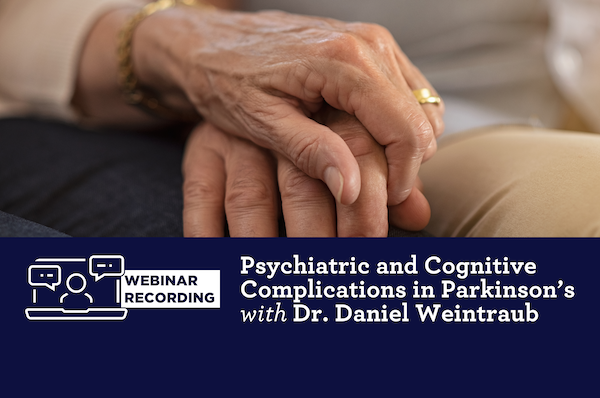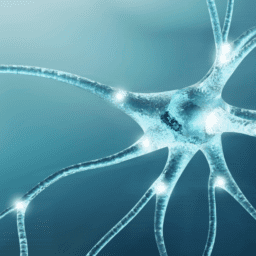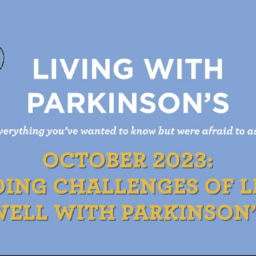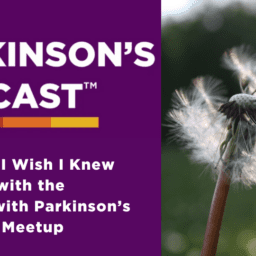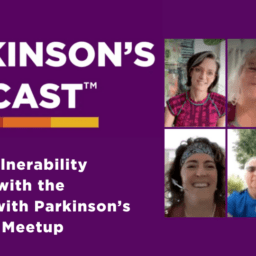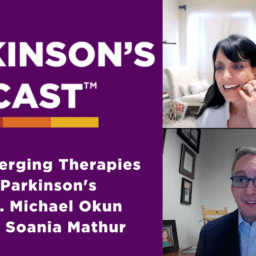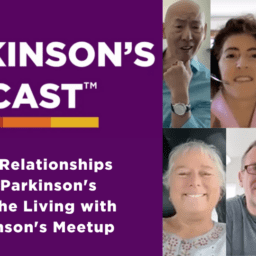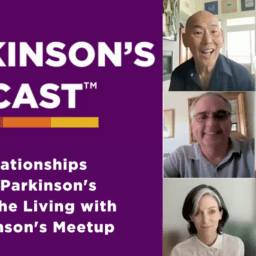In this webinar, Dr. Daniel Weintraub, Assistant Professor of Psychiatry at the University of Pennsylvania and Fellow at the University of Pennsylvania Institute of Aging, explains the nature of cognitive decline, depression, anxiety, psychosis and impulse control disorders.
Dr. Soania Mathur, a Davis Phinney Foundation Board Member who is living with Parkinson’s, moderates the discussion and makes it useful and accessible for people with Parkinson’s and their care partners.
To get access to the recording of the webinar, click here.
There are many medical terms and medications mentioned in this webinar; so, we’ve created a list you can refer to while you watch.
Terms Used in this Webinar
Acetylcholine – A brain chemical that acts as both a neurotransmitter and a neuromodulator and plays a role in muscle function, attention, arousal, memory and motivation. Acetylcholine is reduced in Parkinson’s-related dementia.
Anticholinergic – A substance that blocks the neurotransmitter acetylcholine at synapses in the nervous system.
Cholinesterase Inhibitors or Acetylcholinesterase Inhibitors – Medications that block the breakdown of the neurotransmitter acetylcholine to help treat Parkinson’s-related dementia.
Comorbid / Comorbidity – The presence of one or more additional conditions co-occurring with a primary condition.
Deep Brain Stimulation (DBS): A surgical procedure involving the implantation of electrodes in specific areas of the brain that produce electrical impulses to help regulate abnormal impulses or affect certain chemicals or cells in the brain. DBS is used to help a variety of neurological conditions, most commonly the motor symptoms of Parkinson’s, including tremor, rigidity, stiffness, slowed movement and walking problems.
Dementia: A decline in cognitive function due to damage or disease in the brain beyond what might be expected from normal aging. Areas particularly affected include memory, attention, judgment, language, planning and problem-solving.
Impulse Control Disorder (ICD) – A set of psychiatric disorders characterized by an inability to control one’s actions, particularly activities that could bring harm to oneself or others. This can be a side effect of certain Parkinson’s medications. People taking dopamine agonists may experience ICDs, including compulsive gambling, eating, shopping and hypersexuality.
Mild Cognitive Impairment (MCI) – A non-motor symptom of Parkinson’s in which people have more trouble with cognition than what would be considered normal for their age. MCI is more than the subtle change or decline associated with aging and may be a precursor to dementia.
Montreal Cognitive Assessment (MoCa) – A brief, 30-question test administered by healthcare providers to assess and track several cognitive functions. The MoCa test is a proven cognitive screening tool for Parkinson’s, Alzheimer’s and other neurological conditions.
Pseudobulbar Affect (PBA) – A condition characterized by an involuntary and uncontrollable reaction of laughter or crying unrelated or disproportionate to an event. Typically occurring in people with neurological conditions.
REM Sleep Behavior Disorder (RBD): A sleep disorder that involves movement and abnormal behavior during the sleep phase with rapid eye movements, the stage of sleep in which dreaming occurs. In normal sleep, muscles are paralyzed during dreaming, except for eye movements. In individuals with RBD, the muscles are not paralyzed, so the dreamer is free to physically act out his or her dreams. RBD is common in people with Parkinson’s and may precede the onset of motor symptoms.
Rasagiline & Selegilene – MAO-B Inhibitors that block the breakdown of dopamine in the brain and enhance the effect of levodopa. Ask your doctor about the use of either of these drugs with any anti-depressant.
Serotonin Syndrome – Overaccumulation or high levels of serotonin due to increased dosages of a medication or the interaction of a new medication with an existing one such as MAO-B Inhibitors and anti-depressants.
Selective Serotonin Reuptake Inhibitors (SSRI) – A type of antidepressant medication that works by increasing levels of serotonin in the brain.
Transcranial Direct Stimulation – A brain-stimulating therapy using constant, low direct electrical current delivered through electrodes mounted to the head. Currently being studied for its potential use with Parkinson’s and Alzheimer’s related dementia.
Transcranial Magnetic Stimulation – A non-invasive therapy of brain stimulation using a changing magnetic field used for the treatment of depression and studied for its potential use with Parkinson’s and Alzheimer’s related dementia.
Medications Mentioned in this Webinar
Benzodiazepine – A class of medications used primarily to treat anxiety. May have cognitive side effects, most notably, the brand name allergy medicine Benadryl.
Memantine – A cognition-enhancing medication used to treat Alzheimer’s.
Naltrexone – A drug within the class of opioid antagonists that may be used to treat Impulse Control Disorder.
Rivastigmine – A cholinesterase inhibitor used to treat dementia caused by Alzheimer’s or Parkinson’s.
Zonisamide – A sulfonamide anticonvulsant that may be used to treat Impulse Control Disorder.
ADDITIONAL RESOURCES
How are Depression, Anxiety, and Apathy Treated?
Impulse Control Disorders and Parkinson’s: What are they and how to manage them
Is Depression Common for People with Parkinson’s?
Depression & Anti-Depressant Medication with Parkinson’s
Anticholinergic Medications to Avoid
Anticholinergic Drugs Linked with Dementia
Dopamine Agonist Withdrawal Syndrome
Deep Brain Stimulation May Increase Dementia Risk in Some Parkinson’s Patients, Study Suggests
UPCOMING WEBINARS
Don’t forget to register for our upcoming webinars. We cover a range of topics pertinent to the Parkinson’s community, so be sure to tune in to get more information and have your questions answered by the experts. Plus, in case you can’t make it live, we will provide a recording to everyone who registers.
The Latest Parkinson’s Research and Clinical Trials with Dr. Drew Kern – Wednesday, October 16 at 12 pm PST
Cognition and How It Intersects with Other Non-Motor Symptoms with Dr. Jennifer G. Goldman – Wednesday, October 30 at 9 am PST
Parkinson’s Nutrition for Living Well Today with Dr. John Eric Duda – Wednesday, November 6 at 12 pm PST
Please email your questions about webinar topics to Melani at mdizon@dpf.org.
Visit our full webinar calendar so you can see past events, see everything that’s coming up and mark your calendars.


